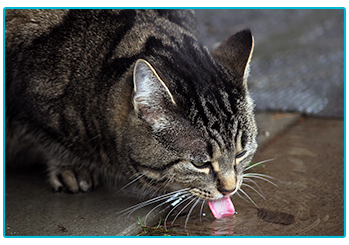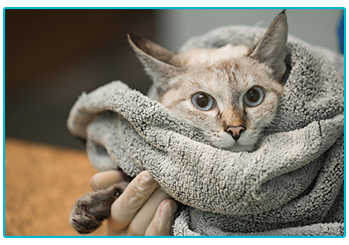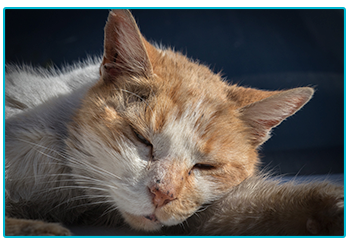As the temperatures drop with the approach of winter, antifreeze can become useful for keeping your car going, or even your garden water feature running! Unfortunately, the active substance, ethylene glycol, that’s found in most antifreeze can be extremely fatal to cats. We’re sharing more information on the poison, as well as how you can try to keep your cat safe from antifreeze.

What are the dangers of antifreeze to cats?
While it might make no sense to us that cats would think it a good idea to drink antifreeze, it in fact has a sweet taste that can be attractive to our feline friends. As little as a teaspoon of antifreeze containing ethylene glycol can prove fatal. When the chemical is broken down in the body it produces toxins that can damage your cat’s kidneys and ultimately lead them to fail.
What symptoms should I look for?
Antifreeze poisoning can act quickly, within 30 minutes of ingestion, so it’s important to recognise the symptoms, which might include:

- Vomiting
- Depression and tiredness
- Incoordination and “drunk” behaviour
- Seizures
- Difficulty breathing.
How is antifreeze poisoning treated?
The treatment your vet might use will depend upon how quickly the poisoning has been detected and diagnosed. If it’s discovered relatively quickly, they may induce vomiting to get the antifreeze out of your cat’s system. An intravenous drip can be used to support the kidneys, and either ethanol or a drug called fomepizole might be administered to attempt to stem the progress of the poison. Blocking ethylene glycol won’t work, however, if the damage is already extensive, and in such a case, there may be no choice other than euthanasia.

How can I protect my cat from antifreeze poisoning?
For outdoor cats, it’s very difficult to completely eliminate the risk of them getting their paws on antifreeze, but there are steps you can take to avoid exposure. Ensure you always clean up any spillages or leaks, as well as keeping antifreeze containers closed tight and in a secure spot. You can also buy antifreeze which is propylene glycol-based rather than ethylene glycol-based. While it’s more expensive, it’s also safer for cats; however you should still keep it out of reach.
Antifreeze poisoning can be fatal for cats, so if you suspect your cat has ingested antifreeze, or if you have any questions, don’t hesitate to contact your vet as soon as possible. You might also like to help to protect your feline friend in the result of misadventure by thinking about cat insurance. At The Insurance Emporium, we offer Cat Insurance with a variety of cover levels, including cover for Vet’s Fees up to £8,000*. You could also get up to 30% discount on your insurance^. Head to The Insurance Emporium today to see if we have the right cover for your cat!
* Cover for Vet’s Fees up to £8,000 available on Lifetime Gold policies only.
^ The 30% discount is made up of 20% Introductory Discount plus 10% Multi-pet Discount (if appropriate). The Introductory Discount is available for the first 12 premium payments on lunar and calendar monthly policies or one payment on annual policies.
All content provided on this blog is for informational purposes only. We make no representations as to the accuracy or completeness of any information on this site or found by following any link on this site. We will not be liable for any errors or omissions in this information nor for the availability of this information. We will not be liable for any loss, injury or damage arising from the display or use of this information. This policy is subject to change at any time.


